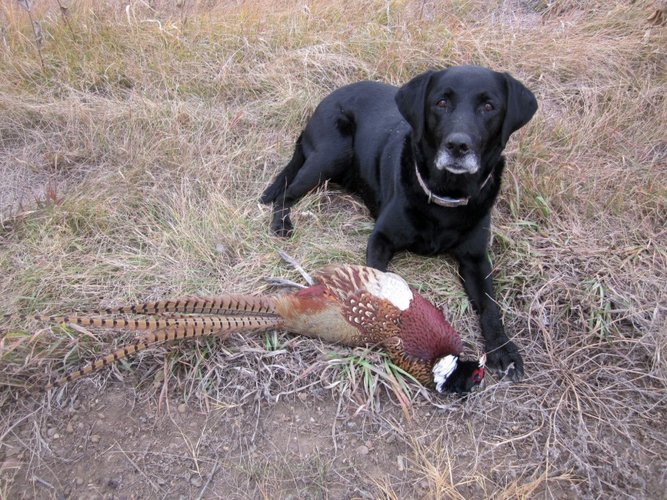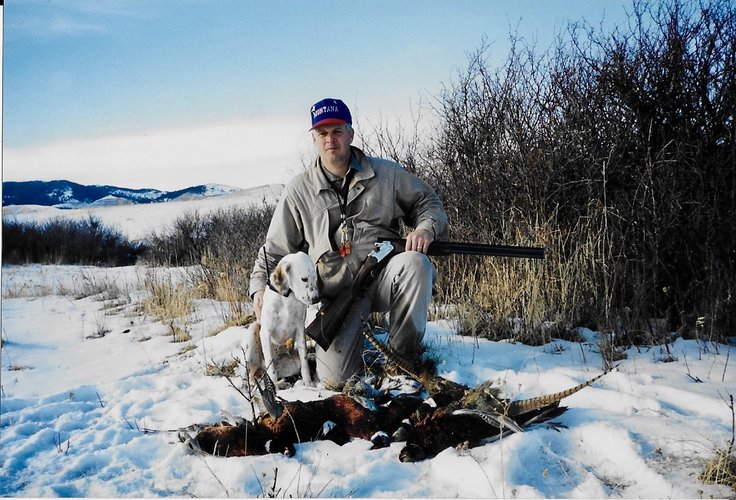OntarioHunter
Well-known member
- Joined
- Sep 11, 2020
- Messages
- 5,998
The best dog I will probably ever own was a Lab-golden cross that cost me $35. Yep, thirty-five bucks. I met the mother and the gal who owned her (golden was her mom's dog). I knew instantly Ethyl (= premium gas in the old days) was special. And she was, in every way, at home, at someone else's home, and in the field. When I had to go out of town on coaching trips the other teachers would fight over who would get to take care of her. She was for all appearances a small black Lab. A guided missile at all times, at work or leisure. No health issues at all that I can recall. She died suddenly and almost instantly at age 11 for unknown reason. Just fell over. We should all be so lucky.
The late great Opal who died of cancer two years ago this May (also age eleven) was a non-papered Lab I picked out of a Great Falls newspaper on impulse during a business trip. After viewing the pups for twenty minutes I told the HS girl selling them that though $220 was almost a ridiculous price for a dog without papers (her dad simply never bothered getting them for the mother), I would write her a cheque for THAT PUP if she still had it when I came back through in three days. I got to see the mother and though not overly impressed I knew this pup was special. The father, a big registered black male, was just a few miles away and I was invited to visit but declined. It wasn't necessary. Within just three months Opal was doing it all - pointing, flushing, and retreiving uplands! She wasn't much bigger then than the roosters she was picking up.

Two of my hunting dogs were "left overs." My first Lab was chocolate which back in the sixties was an undesirable characteristic. Anything but black was often destroyed. We had just lost a pup out of the same bitch and the breeder let us have Cocoa, a genetic throwback accident, for the price of shots and feed. About $50 as I recall. She was a great dog and being my first we learned the ropes of bird hunting together ... very easily. My present Fr Britt was picked up when someone backed out on an order. So I didn't get to choose. But somehow I still wound up with the prettiest pup in the litter. I think the breeder rigged that since he knew the reason I was after another dog (just lost my wife and son). Puppy (aka Coral) has been great ... with no pointer training for her or me. She wasn't cheap - $800 nine years ago - but has probably been the cheapest to maintain. I don't think she's ever been to the vet for anything but shots.
Moral of the story: you are less likely to encounter genetic issues with a crossbreed (though they can still crop up). What kind of crossbreed? I think I would stay away from the "doodle" dogs. Not impressed with the ones I have been around. They seem to be colorless personality and not a few have been downright scatterbrained. The Lab-GSP crosses are sometimes a bit too wound up for my taste and they tend to lack the Lab's insulating layer of fur for waterfowl hunting. Don't believe I have seen a Lab-English setter cross but sounds interesting.
Personally, I would advise you to keep shopping for a purebred Lab. Wait till late spring or early summer when the market should be easier (later in the year and less likely to have competing bids from hunters wanting to use the pup this fall). I can almost guarantee you that a Lab pup will not require expensive professional training unless you are thinking of competition ... and obviously you aren't. All you need is a good obedience foundation established from living in the home and instinct should do the rest in the field. Labs are known for their eagerness to please and pliability. They are the definition of "bullet proof." Fortunately, the old hip problems from early to mid 20th century are relatively rare today. I haven't encountered hip dysplasia in a Lab for maybe forty years. Epilepsy seems to be the up and coming concern in both Labs and goldens.
The late great Opal who died of cancer two years ago this May (also age eleven) was a non-papered Lab I picked out of a Great Falls newspaper on impulse during a business trip. After viewing the pups for twenty minutes I told the HS girl selling them that though $220 was almost a ridiculous price for a dog without papers (her dad simply never bothered getting them for the mother), I would write her a cheque for THAT PUP if she still had it when I came back through in three days. I got to see the mother and though not overly impressed I knew this pup was special. The father, a big registered black male, was just a few miles away and I was invited to visit but declined. It wasn't necessary. Within just three months Opal was doing it all - pointing, flushing, and retreiving uplands! She wasn't much bigger then than the roosters she was picking up.

Two of my hunting dogs were "left overs." My first Lab was chocolate which back in the sixties was an undesirable characteristic. Anything but black was often destroyed. We had just lost a pup out of the same bitch and the breeder let us have Cocoa, a genetic throwback accident, for the price of shots and feed. About $50 as I recall. She was a great dog and being my first we learned the ropes of bird hunting together ... very easily. My present Fr Britt was picked up when someone backed out on an order. So I didn't get to choose. But somehow I still wound up with the prettiest pup in the litter. I think the breeder rigged that since he knew the reason I was after another dog (just lost my wife and son). Puppy (aka Coral) has been great ... with no pointer training for her or me. She wasn't cheap - $800 nine years ago - but has probably been the cheapest to maintain. I don't think she's ever been to the vet for anything but shots.
Moral of the story: you are less likely to encounter genetic issues with a crossbreed (though they can still crop up). What kind of crossbreed? I think I would stay away from the "doodle" dogs. Not impressed with the ones I have been around. They seem to be colorless personality and not a few have been downright scatterbrained. The Lab-GSP crosses are sometimes a bit too wound up for my taste and they tend to lack the Lab's insulating layer of fur for waterfowl hunting. Don't believe I have seen a Lab-English setter cross but sounds interesting.
Personally, I would advise you to keep shopping for a purebred Lab. Wait till late spring or early summer when the market should be easier (later in the year and less likely to have competing bids from hunters wanting to use the pup this fall). I can almost guarantee you that a Lab pup will not require expensive professional training unless you are thinking of competition ... and obviously you aren't. All you need is a good obedience foundation established from living in the home and instinct should do the rest in the field. Labs are known for their eagerness to please and pliability. They are the definition of "bullet proof." Fortunately, the old hip problems from early to mid 20th century are relatively rare today. I haven't encountered hip dysplasia in a Lab for maybe forty years. Epilepsy seems to be the up and coming concern in both Labs and goldens.
Last edited:





